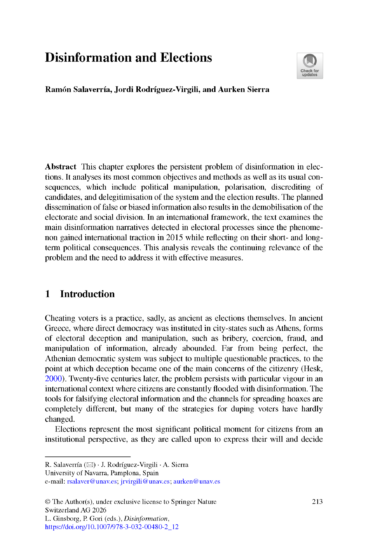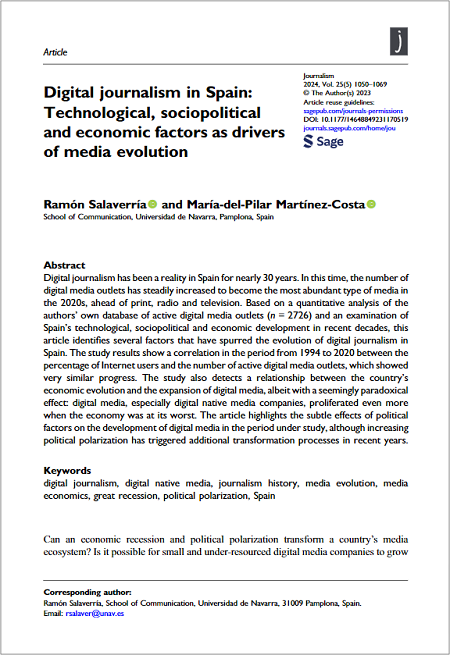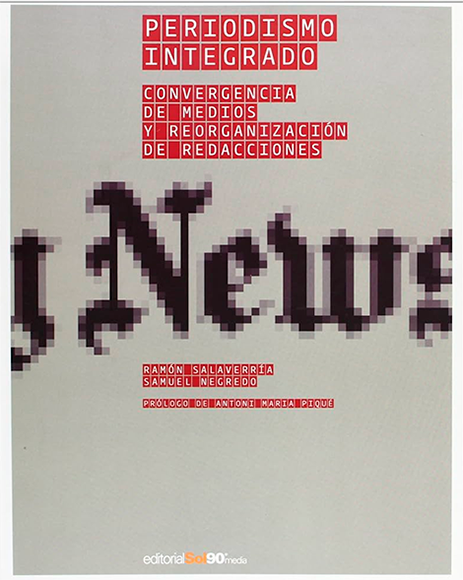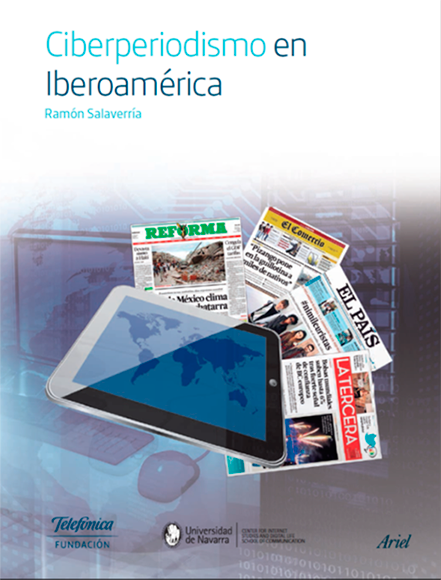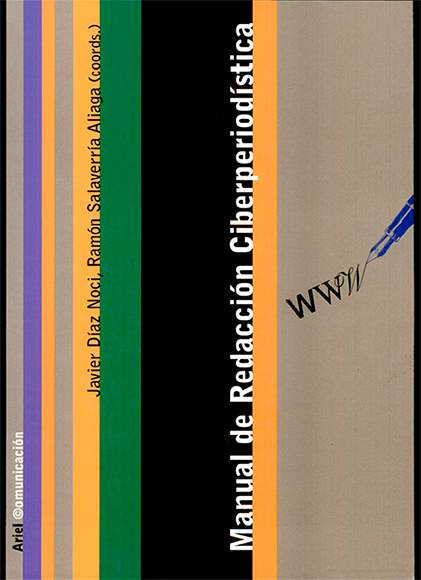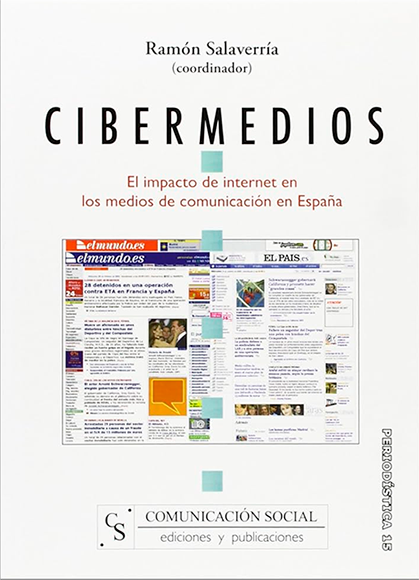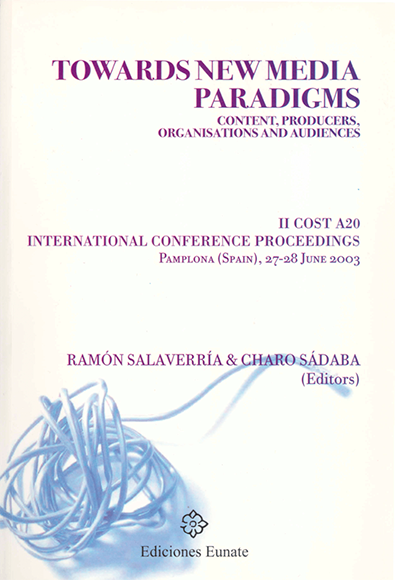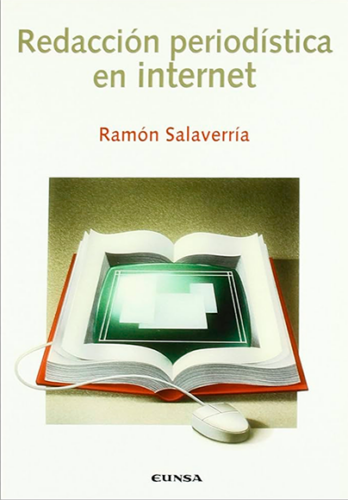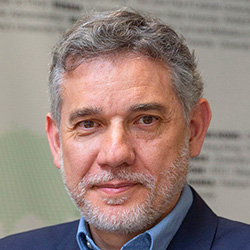■ Media & interviews
Ramón Salaverría: «Quien más alimenta la desinformación es la clase política, no los medios periodísticos», El Mundo, pp. 2-3, 7 febrero 2026.
More:
■ Recent publications
Most recent publications on my current research topics: digital journalism, disinformation and artificial intelligence.
■ Recent publications
BOOK CHAPTER — January 2026
Salaverría, R., Rodríguez-Virgili, J., & Sierra, A. (2026). Disinformation and Elections. In Ginsborg, L., & Gori, P. (Eds.) Disinformation. A Multi-Disciplinary Analysis (pp. 213-226). Springer. ISBN: 978-3-032-00479-6. DOI:10.1007/978-3-032-00480-2_12
Abstract
This chapter explores the persistent problem of disinformation in elections. It analyses its most common objectives and methods as well as its usual consequences, which include political manipulation, polarisation, discrediting of candidates, and delegitimisation of the system and the election results. The planned dissemination of false or biased information also results in the demobilisation of the electorate and social division. In an international framework, the text examines the main disinformation narratives detected in electoral processes since the phenomenon gained international traction in 2015 while reflecting on their short- and long-term political consequences. This analysis reveals the continuing relevance of the problem and the need to address it with effective measures.
COMMENTARY — July 2025
Westlund, O., Carlson, M., Hamada, B., Helberger, N., Lecheler, S., Lewis, S.C., Quandt, T., Reese, S.D., Salaverría, R., Saldaña, M., Thomson, T.J., Wahl-Jorgensen, K., & Wu, S. (2025). Public Knowledge and Expertise Under Authoritarian Siege: A Defense of Academic Freedom from Digital Journalism Studies. Digital Journalism, 13(5), 869-892. DOI:10.1080/21670811.2025.2527997
Abstract
This article addresses the growing global assault on academic freedom—a cornerstone of democratic societies now under increasing threat from authoritarian regimes. It highlights a global decline in that freedom since its peak 20 years ago, focusing on the United States in 2025 to illustrate rapidly escalating academic silencing, even in a country with well-established democratic freedoms and institutions. Drawing on the collective expertise of international scholars in digital journalism studies (DJS)—a field situated at the crossroads of vulnerable institutions—and informed by anonymous reports from U.S.-based academics as well as the wider academic literature, this commentary examines the impact of political interference, censorship, and self-censorship in academia. It argues that DJS as a field must develop approaches that actively resist authoritarianism and uphold freedom of expression and inquiry. The commentary concludes with a normative framework for doing this, proposing a three-pronged approach to defending the larger field, the scholarship within it, and the wellbeing of individual scholars of digital journalism studies.
BOOK CHAPTER — July 2025
Salaverría, R. (2025). Evolución de los medios digitales. In: García-Orosa, B.; Vázquez-Herrero, J.; López-García, X. (coords.), De nativos a integrados. Treinta años de transformación digital de los medios en España (pp. 39-62). Salamanca: Comunicación Social Ediciones y Publicaciones. DOI:10.52495/c2.emcs.39.p115 ISBN: 978-84-10176-10-2
Abstract
Este texto analiza desde una perspectiva teórica la evolución de los medios digitales que ha modelado el ecosistema mediático digital de España en las últimas tres décadas. A partir de una revisión crítica de las clasificaciones existentes de medios digitales, el texto aborda la distinción entre «medios nativos digitales» y aquellos que propone denominar «medios digitales derivados». A partir de la definición y discriminación conceptual de ambos tipos de medios, el texto muestra por qué los modelos tipológicos basados en el origen de los medios comienzan a estar en declive. En su lugar, plantea un criterio tipológico alternativo basado en el grado de influencia de los medios; bajo este marco, propone las categorías de «medios digitales dominantes» y «medios digitales secundarios». El texto culmina con una representación del ecosistema mediático digital mediante un cuadrante analítico que sintetiza estas dos dimensiones principales: origen e influencia. Esta herramienta conceptual permite visualizar la distribución actual de los medios digitales y comprender mejor sus dinámicas de transformación y consolidación.
Larraz, I., & Salaverría, R. (2025). La verificación multimodal en el fact-checking automatizado: hacia una definición. In: E. Ortega Fernández, L. La Rosa Barrolleta, & M. J. Ufarte Ruiz (Eds.), La integración de la inteligencia artificial en la comunicación digital (pp. 163-181). Valencia: Tirant Lo Blanch. ISBN: 978-84-1081-328-1
Abstract
(…) Este capítulo busca definir qué es la verificación multimodal y ofrecer
una revisión de las metodologías que se han utilizado para automatizar
esta tarea, a través de un análisis de los trabajos publicados.
Esto último incluye desde la recuperación de evidencia multimodal a
partir de texto, imagen, audio y vídeo, hasta la generación de explicaciones
con inteligencia artificial generativa. De esta forma, se pueden
comparar las conclusiones predominantes sobre el funcionamiento
de estos sistemas. (…)
REPORT — June 2025
Bleyer-Simon, K., Horowitz, M. A., Botan, M., Brautovic, M., Brogi, E., Bucholtz, I., Culloty, E., Gavurova, B., Grabovac, A., Ioakem, S., Kermer, J. E., Kiely, K., Leonidou, P., Mallia, M., Moreno, J., Nenadić, I., Paisana, M., Palmer, M., Reviglio, U., Magallon-Rosa, R., Salamanos, N., Salaverría Aliaga, R., Sessa, M. G., Sitistas, T., Soukupová, J., Torpan, S., Weikmann, T. (2025). How is disinformation addressed in the member states of the European Union? – 27 country cases. Florence, Italy: European Digital Media Observatory.
Abstract
The report is composed of 27 cases – the EU member states – and describes how national governments and policymakers address disinformation. The case studies identify legislative and non-legislative approaches, strategies, policy documents, as well as proposed laws and policies, complemented with information about certain structural conditions that can impact countries’ measures on disinformation.
The aim of the report is to better understand what kinds of policy tools are commonly utilised in EU member states to create a safer information environment and to foster greater societal resilience – complementing an already institutionalised European approach on disinformation. Moreover, it aims to identify dominant approaches and to help policymakers understand what mix of policies can be preferable in certain contexts.
The report presents selected findings concerning countries, as gathered from available reports and policy documents reviewed by EDMO Hubs, and does not necessarily reflect the views of EDMO or intend to provide a comprehensive picture of legislative or policy landscape.
INTRODUCTION — March 2025
Westlund, O., Boyles, J. L., Guo, L., Saldaña, M., Salaverría, R., Thomson, T. J., & Wu, S. (2025). Digital Journalism (Studies): An Agenda for the Future. Digital Journalism. DOI:10.1080/21670811.2025.2474530
Abstract
Digital Journalism has an important role to play in encouraging and publishing research with societal relevance that advances digital journalism studies as a field. In this article we discuss the multiple types of articles we publish: research articles, conceptual articles, review articles, advancing methods articles and commentaries. We also introduce you to several great examples of such articles, as well as introduce the growing number of articles that have received outstanding article awards over the years. Finally, we present our revised editorial agenda that will guide our priorities for the editorial processing of article submissions in the year(s) to come. The editorial agenda consists of five key thematic areas, each featuring carefully selected bullet points outlining our key research priorities. We set the context for each of these thematic areas by positioning them in relation to some of the research we have published in recent years.
RESEARCH ARTICLE — February 2025
Larraz, I., Salaverría, R., & Serrano, J. (2024). Fact-checking automation: An ethnographic approach to newsrooms. Medijske Studije / Media Studies, 15(30), 51-71. DOI:10.20901/ms.15.30.3
Abstract
This article explores the adoption of artificial intelligence-driven automation tools in fact-checking newsrooms, focusing on their potential to enhance verification efficiency and reach. Using digital ethnography and semi-structured interviews with executives, journalists, and engineers from Duke Reporters’ Lab (USA) and Full Fact (UK), the study examines the motivations for adopting these tools, their impact on fact-checking practices, perceived benefits, user attitudes, and measurable outcomes. Findings reveal significant variations in approaches and results across newsrooms, underscoring ongoing challenges in implementing automation tools within complex workflows. This work advances understanding of automation’s role in fact-checking and offers insights for future research.
■ Books
Single-authored books, co-edited monographs and conference proceedings edited by Ramón Salaverría.
■ Media & interviews
¿Cómo funciona la desinformación? | Entrevista con Ramón Salaverría, coordinador de Iberifier, Fundación Hermes, 11 June 2025.
«La IA va a ser una revolución aún más profunda que la que supuso internet», El Correo (Bilbao), p. 48, June 11, 2024.
More:
■ Teaching
On the academic year 2023-24, my colleague Clara González Tosat and I started the subject Artificial Intelligence in Journalism at the School of Communication, University of Navarra. Since then, we are exploring with students the use of AI in newswork: research, generation and distribution of news, and fact-checking. Watch this video that summarizes our pioneering experience.
■ Thoughts
X post, August 25, 2014.
El periodismo es como el café: hay que servirlo rápido, endulzarlo lo justo y no estropearlo con mala leche.
■ Author
Ramón Salaverría, PhD, MAE
Full Professor of Journalism at University of Navarra and Member of Academia Europæa (MAE). My research focuses on digital journalism and disinformation.
Author of over 300 scholarly publications, I am listed in the Stanford University ranking of the World’s most cited researchers. Award-winner of the ‘Researcher of the Year’ prize at the Roblon Awards, which recognizes excellence on media and communication research in Spanish-speaking countries.
With an extensive career as a researcher and leader of national and international research projects, I am currently the principal investigator of Iberifier, the Iberian digital media observatory funded by the European Commission. I chaired the Journalism Studies Section of ECREA, as well as the Committee of Experts on Increasing Resilience of Media (MSI-RES) at the Council of Europe.
I have served as visiting researcher at the University of Texas at Austin (USA), as well as a guest professor at a dozen universities in Europe and the Americas. I have delivered keynotes, workshops and training programs in more than 30 countries.
Full bio & publications: web | pdf

